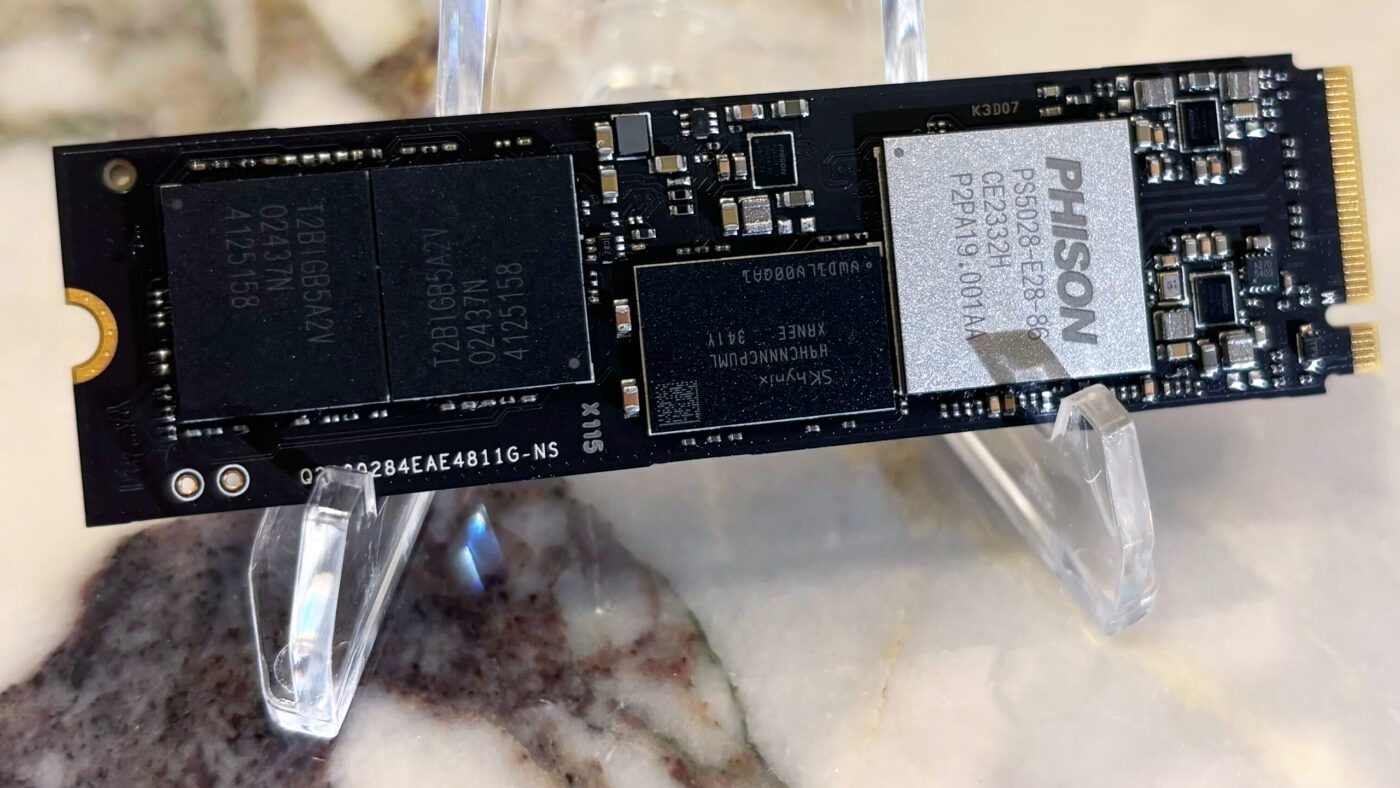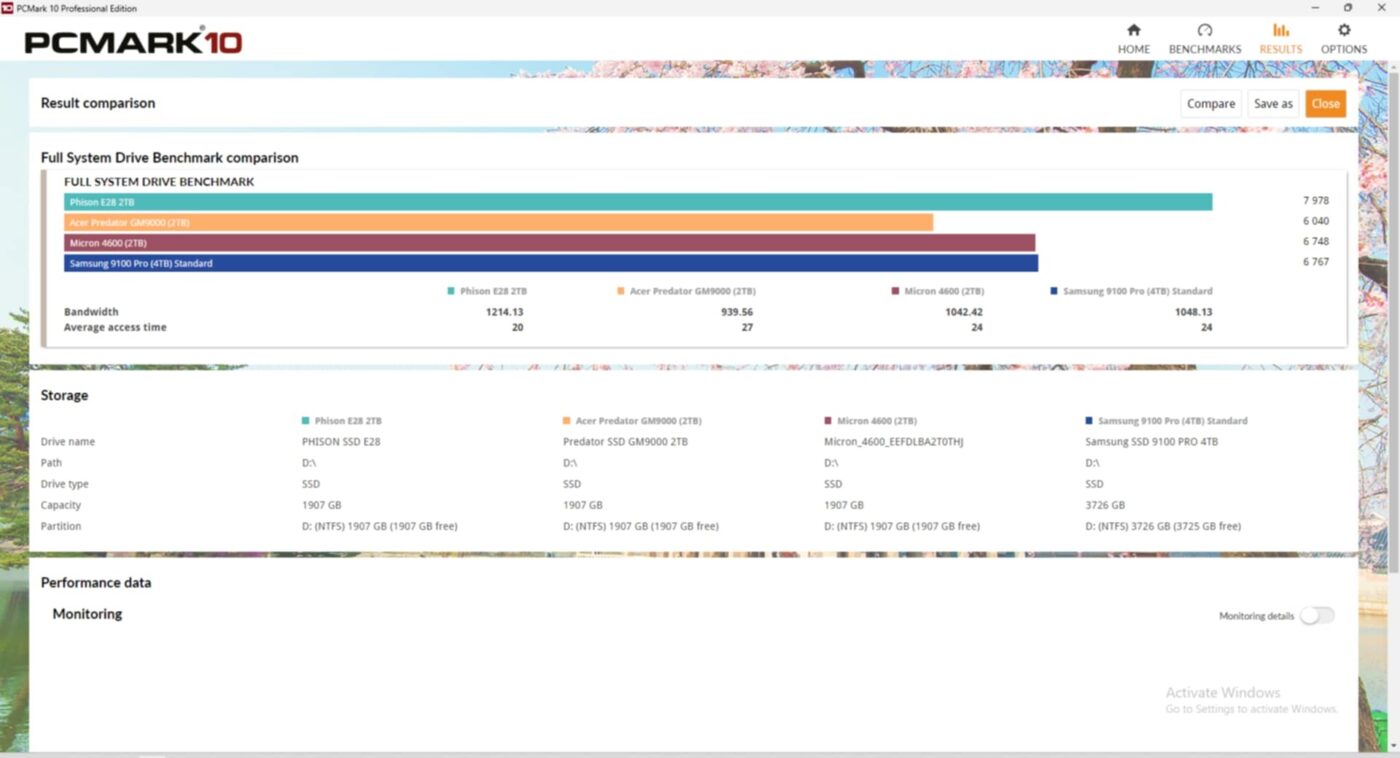The Phison E28 may be the king of PCIe 5.0 SSD controllers.

Earlier this year, Phison announced the PS5028-E28, the company’s next-generation PCIe 5.0 SSD controller. While PCIe 5.0 drives utilizing this high-performance controller are expected to be available later this year, Tom’s Hardware has obtained an exclusive preview of the E28’s capabilities.
The Phison E28 SSD faced three formidable competitors: the Samsung 9100 Pro, Micron 4600, and Acer Predator GM9000. The benchmark utilized for the comparison was PCMark 10, specifically the Full System Drive test, which offers a realistic representation of each SSD’s real-world performance. The tests evaluate everyday tasks, such as opening specific applications or games, and copying files of different formats from one destination to another.
Although the results originate from a thoroughly vetted and trustworthy source, we advise exercising caution when interpreting them. The PCMark 10 scores indicated that the Phison E28 significantly outperformed its competitors. It was approximately 18% quicker than the Samsung 9100 Pro and Micron 4600. Furthermore, the Phison E28 surpassed the Predator GM9000 by as much as 32%.
Phison PS5028-E28 SSD Benchmark
| SSD | Phison E28 | Samsung 9100 | Micron 4600 | Acer Predator GM9000 |
|---|---|---|---|---|
| PCMark 10 Score | 7,978 | 6,767 | 6,748 | 6,040 |
| Bandwidth (B/s) | 1,214.13 | 1,048.13 | 1,042.42 | 939.56 |
| Average Access Time (μs) | 20 | 24 | 24 | 27 |
The PCMark 10 storage benchmark also yielded two additional metrics worth examining. The software assessed each SSD’s bandwidth and average access times. A higher score indicates better bandwidth performance, whereas a lower score is preferred for access times.
The Phison E28 exhibited 16% higher bandwidth than the Samsung 9100 Pro and Micron 4600. Compared to the Predator GM9000, the Phison E28 stretched the margin to 29%. Meanwhile, the Phison E28 demonstrated 17% lower average access times than the Samsung 9100 Pro and Micron 4600. As expected, the gap between the Phison E28 and Predator GM9000 was more significant, up to 26% lower for the former.

The sequential performance difference between the Samsung Presto and Phison E28 controllers appears minimal on paper. The former has a 2% faster sequential read, and the latter has an 8% faster sequential write. The random performance, however, significantly inclines to the Phison E28 with 36% better random reads and 15% better random writes.
The PCMark 10 results show that the Phison E28 is faster than the Samsung Presto and the Silicon Motion SM2508, which seem to share comparable performance. However, as the results corroborate, not all SM2508-based drives offer the same level of performance. The type of NAND is a huge differentiator.
Despite featuring the same SM2508 controller, the Micron 4600 and Predator GM9000 have a huge performance delta. The former leverages Micron 276-layer B68S FortisFlash NAND clocked at 3,600 MT/s, whereas the latter utilizes Micron 232-layer B58R FortisFlash at 2,400 MT/s.
| SSD | Phison E28 | Samsung 9100 Pro | Micron 4600 | Acer Predator GM9000 |
|---|---|---|---|---|
| Controller | PS5028-E28 | Presto | SMI SM2508 | SMI SM2508 |
| Capacity | 2TB | 4TB | 2TB | 2TB |
| Sequential Read (MB/s) | 14,500 | 14,800 | 14,500 | 14,000 |
| Sequential Write (MB/s) | 14,500 | 13.,400 | 12,000 | 13,000 |
| Random Read (IOPS) | 3,000,000 | 2,200,000 | 2,100,000 | 2,000,000 |
| Random Write (IOPS) | 3,000,000 | 2,600,000 | 2,100,000 | 1,600,000 |
We cannot definitively declare a winner based solely on a single benchmark, and it would be wrong to do so. SSD controllers or SSDs in general may exhibit strong performance on specific workloads while demonstrating underperformance in others. Reviews hold significant value as they evaluate across a variety of workloads. As far as PCMark 10 is concerned, the Phison E28 appears superior to the Samsung Presto and Silicon Motion SM2508.
Other manufacturers of SSD controllers, such as InnoGrit (commonly referred to as Yingren Technology in China), Marvell, and Maxio, are also present. Nonetheless, the competition for the leading PCIe 5.0 SSD controller primarily lies among the big three (Phison, Samsung, and Silicon Motion) unless InnoGrit presents a more competitive offering. Currently, Phison, with its E28 model, seems to possess a competitive advantage over the competition.
